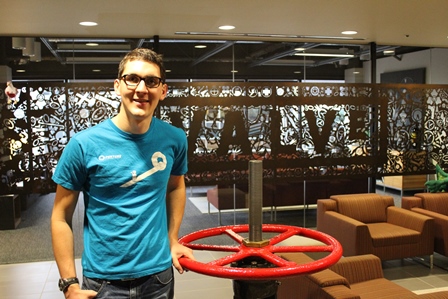MSU Grad Student Dives Into Video Game Economics
-written by Brent Zundel for the Exponent

He does not technically have a boss. He has flexible hours at an office that offers bike parking, a fully stocked fridge and a weekly company lunch. And he and his colleagues work in small groups called “cabals,” surrounded by other employees who are paid to play video games.
Miller works as an economist for Valve Corporation, a video game development and digital distribution company based in Bellevue, Wash., just across Lake Washington from Seattle.
Valve is well known for titles like the critically acclaimed Half Life series, Left 4 Dead, Defense of the Ancients (DotA) and Portal. They are also known for developing Steam, a unique digital distribution platform for software and games.
In January 2012, Miller reached out to Valve, asking for information on their virtual markets to incorporate into his master’s research. Soon, he received a phone call he described as a “thinly veiled job interview.” Miller impressed his clandestine interviewer and started his new job at Valve this May.
Currently, he is in the process of completing his master’s coursework while trying to find the time to work on his thesis. He explained that he’s looking into the interactions of individuals in virtual markets and hopes to apply what he learns to the world at large.
At Valve, Miller works on a variety of cutting-edge projects, everything from analyzing how users “estimate the value of virtual scarce goods” to investigating altruism in player interactions. He’s also attempting to develop better ways to measure player happiness, “utility,” in economist-speak.
At a recent tour given to this reporter, Miller described Valve’s unique horizontal management structure. The company employs about 300 artists, programmers, writers and other specialists who bring creativity to the company.
“All our desks have wheels,” Miller explained. Organic groups, the “cabals” mentioned earlier, form and dissolve as needed for projects old and new. “I go where I feel I can do the most good for the company,” he said.
The company does have an organizational structure, which allows for effective long-term planning, but Miller believes that the fluid groups allow them to react quickly to changing conditions.
Originally from Pilot Butte, Saskatchewan, a town about seven miles east of Regina, Miller came to MSU in a roundabout fashion. His father graduated from MSU, so they visited every winter to ski when he was growing up. In 2008, he attended MSU for a year on exchange from the University of Regina and fell in love with Montana and the “quality of education” and “sense of community” at MSU so he transferred.
He graduated in spring 2011 with bachelor’s degrees in economics and finance and is now pursuing his master’s in applied economics.
Miller also earned some economic experience with the U.S. Senate Finance Committee during the summer of 2010. He served as a research intern, analyzing federal investment multipliers, helping plan the 2010 Montana Economic Development summit and researching legislation like credit card interchange fees and taxation of carried interest.
One of Miller’s life passions is cycling. During his time at MSU, he was president of the Bobcat Cycling Club. This past July, he rode along with the Tour de France for 13 days, dispelling any stereotypes about feeble, bookish economists.
Miller completed La tape du Tour, an organized event that allows amateur cyclists to race over the same route as the professional Tour itself. This ride took him through the imposingly named “Circle of Death” in the Pyrenees Mountains along a 132-mile route, comprised of four lung-busting mountain passes and more than 15,000 feet of vertical ascent.
At the end of that grueling ride, he missed his train and had to hitchhike nearly 30 miles back to his hotel with a friend.
With such an impressive background, what are Miller’s goals for the future? Right now, he wants to complete his master’s and keep working at Valve. Miller hopes to grow their analysis team because, as he explained, there are “10 times as many questions as we have answers.”

